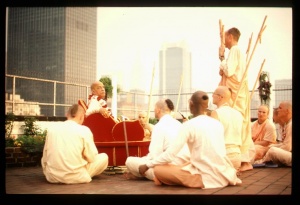CC Madhya 2.18 (1975): Difference between revisions
(Vanibot #0027: CCMirror - Mirror CC's 1996 edition to form a basis for 1975) |
(Vanibot #0020: VersionCompareLinker - added a link to the Version Compare feature) |
||
| Line 2: | Line 2: | ||
<div style="float:left">'''[[Sri Caitanya-caritamrta (1975)|Śrī Caitanya-caritāmṛta (1975)]] - [[CC Madhya (1975)|Madhya-līlā]] - [[CC Madhya 2 (1975)|Chapter 2: The Ecstatic Manifestations of Lord Śrī Caitanya Mahāprabhu]]'''</div> | <div style="float:left">'''[[Sri Caitanya-caritamrta (1975)|Śrī Caitanya-caritāmṛta (1975)]] - [[CC Madhya (1975)|Madhya-līlā]] - [[CC Madhya 2 (1975)|Chapter 2: The Ecstatic Manifestations of Lord Śrī Caitanya Mahāprabhu]]'''</div> | ||
<div style="float:right">[[File:Go-previous.png|link=CC Madhya 2.17 (1975)|Madhya-līlā 2.17]] '''[[CC Madhya 2.17 (1975)|Madhya-līlā 2.17]] - [[CC Madhya 2.19 (1975)|Madhya-līlā 2.19]]''' [[File:Go-next.png|link=CC Madhya 2.19 (1975)|Madhya-līlā 2.19]]</div> | <div style="float:right">[[File:Go-previous.png|link=CC Madhya 2.17 (1975)|Madhya-līlā 2.17]] '''[[CC Madhya 2.17 (1975)|Madhya-līlā 2.17]] - [[CC Madhya 2.19 (1975)|Madhya-līlā 2.19]]''' [[File:Go-next.png|link=CC Madhya 2.19 (1975)|Madhya-līlā 2.19]]</div> | ||
{{CompareVersions|CC|Madhya 2.18|CC 1975|CC 1996}} | |||
{{RandomImage}} | {{RandomImage}} | ||
==== TEXT 18 ==== | ==== TEXT 18 ==== | ||
<div class="verse"> | <div class="verse"> | ||
:prema-ccheda-rujo | :prema-ccheda-rujo 'vagacchati harir nāyaṁ na ca prema vā | ||
:sthānāsthānam avaiti nāpi madano jānāti no durbalāḥ | :sthānāsthānam avaiti nāpi madano jānāti no durbalāḥ | ||
:anyo veda na cānya-duḥkham akhilaṁ no jīvanaṁ vāśravaṁ | :anyo veda na cānya-duḥkham akhilaṁ no jīvanaṁ vāśravaṁ | ||
| Line 20: | Line 19: | ||
<div class="synonyms"> | <div class="synonyms"> | ||
prema-cheda-rujaḥ—the sufferings of a broken loving relationship; avagacchati—knows; hariḥ—the Supreme Lord; na—not; ayam—this; na ca—nor; prema—love; vā—nor; sthāna—the proper place; asthānam—an unsuitable place; avaiti—knows; na—not; api—also; madanaḥ—Cupid; jānāti—knows; | prema-cheda-rujaḥ—the sufferings of a broken loving relationship; avagacchati—knows; hariḥ—the Supreme Lord; na—not; ayam—this; na ca—nor; prema—love; vā—nor; sthāna—the proper place; asthānam—an unsuitable place; avaiti—knows; na—not; api—also; madanaḥ—Cupid; jānāti—knows; naḥ—us; durbalāḥ—very weak; anyaḥ—another; veda—knows; na—not; ca—also; anya-duḥkham—the difficulties of others; akhilam—all; naḥ—our; jīvanam—life; vā—or; āśravam—simply full of miseries; dvi—two; trāṇi—three; eva—certainly; dināni—days; yauvanam—youth; idam—this; hā-hā—alas; vidhe—O creator; kā—what; gatiḥ—our destination. | ||
</div> | </div> | ||
| Line 27: | Line 26: | ||
<div class="translation"> | <div class="translation"> | ||
[Śrīmatī Rādhārāṇī used to lament:] | "[Śrīmatī Rādhārāṇī used to lament:] 'Our Kṛṣṇa does not realize what we have suffered from injuries inflicted in the course of loving affairs. We are actually misused by love because love does not know where to strike and where not to strike. Even Cupid does not know of our very weakened condition. What should I tell anyone? No one can understand another's difficulties. Our life is actually not under our control, for youth will remain for two or three days and soon be finished. In this condition, O creator, what will be our destination?' | ||
</div> | </div> | ||
| Line 34: | Line 33: | ||
<div class="purport"> | <div class="purport"> | ||
This verse is from the Jagannātha-vallabha-nāṭaka (3.9) | This verse is from the Jagannātha-vallabha-nāṭaka (3.9), by Rāmānanda Rāya. | ||
</div> | </div> | ||
Latest revision as of 12:20, 27 January 2020

A.C. Bhaktivedanta Swami Prabhupada
TEXT 18
- prema-ccheda-rujo 'vagacchati harir nāyaṁ na ca prema vā
- sthānāsthānam avaiti nāpi madano jānāti no durbalāḥ
- anyo veda na cānya-duḥkham akhilaṁ no jīvanaṁ vāśravaṁ
- dvi-trāṇy eva dināni yauvanam idaṁ hā-hā vidhe kā gatiḥ
SYNONYMS
prema-cheda-rujaḥ—the sufferings of a broken loving relationship; avagacchati—knows; hariḥ—the Supreme Lord; na—not; ayam—this; na ca—nor; prema—love; vā—nor; sthāna—the proper place; asthānam—an unsuitable place; avaiti—knows; na—not; api—also; madanaḥ—Cupid; jānāti—knows; naḥ—us; durbalāḥ—very weak; anyaḥ—another; veda—knows; na—not; ca—also; anya-duḥkham—the difficulties of others; akhilam—all; naḥ—our; jīvanam—life; vā—or; āśravam—simply full of miseries; dvi—two; trāṇi—three; eva—certainly; dināni—days; yauvanam—youth; idam—this; hā-hā—alas; vidhe—O creator; kā—what; gatiḥ—our destination.
TRANSLATION
"[Śrīmatī Rādhārāṇī used to lament:] 'Our Kṛṣṇa does not realize what we have suffered from injuries inflicted in the course of loving affairs. We are actually misused by love because love does not know where to strike and where not to strike. Even Cupid does not know of our very weakened condition. What should I tell anyone? No one can understand another's difficulties. Our life is actually not under our control, for youth will remain for two or three days and soon be finished. In this condition, O creator, what will be our destination?'
PURPORT
This verse is from the Jagannātha-vallabha-nāṭaka (3.9), by Rāmānanda Rāya.